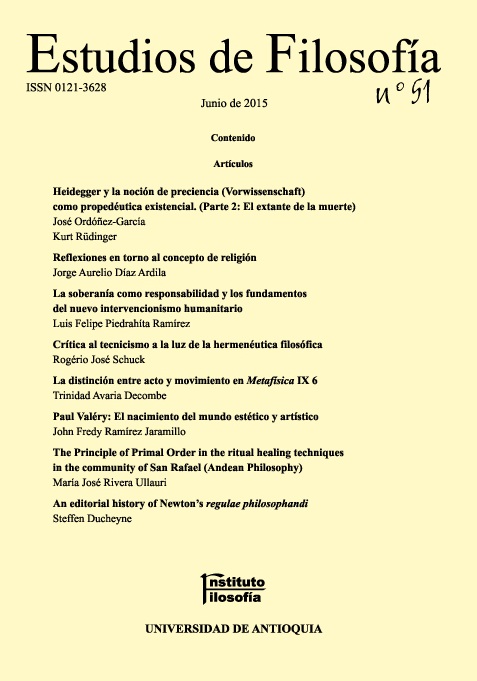A critique on technicism in the light of philosophical hermeneutics
DOI:
https://doi.org/10.17533/udea.ef.n51a05Keywords:
Hermeneutics, Modernity, knowledge, technicism, truth, method, learningAbstract
This text critiques modernity, by focusing on technicism and on the claim that reason is absolute. It does not deny the benefits originated from modernity, especially those related to science and to technological breakthroughs; rather than that, it attempts to identify the limits inherent to reason, by stating its impossibility to totally comprehend knowledge, showing something that escapes its claim to be ubiquitous. In order to do that, methodologically following hermeneutics, through the paths opened by Gadamer, room is made for reflection based on other paths, also including Descartes's contributions on the emergence of modernity, as well as Schleiermacher's, within the context of modern hermeneutics. The interlocution with Flickinger shows that, beyond the scientificist perspective, hermeneutics contributes to achieving a new level of understanding, and a new relationship with it.
Downloads
References
Capra, F.; Cabral, A. (2006) O ponto de mutação, Trad. de Álvaro Cabral, 27. ed., São Paulo, Cultrix.
Flickinger, H-G. (2003) O Fundamento Ético da Hermenêutica Contemporânea. En: Oliveira, A. R. E Oliveira, N. A. (ed.). Fides et Ratio: Festschrift em homenagem a Cláudio Neutzling, Pelotas, EDUCAT.
Gadamer, H-G. (1996) Verdad y Método I: Fundamentos de una hermenéutica filosófica, Trad. de Ana Agud Aparicio y Rafael de Agapito, Salamanca, Sígueme.
Gadamer, H.-G. (2007) Hermenêutica em retrospectiva, Trad. de Marco Antônio Casanova, Petrópolis, RJ, Vozes.
Heidegger, M. (1998) Ser y Tiempo, Trad. Jorge Eduardo Rivera C., Santiago de Chile, Universitaria.
Schleiermacher, F. (1995) Hermeneutik und Kritik, Frankfurt am Main, Suhrkamp.
Schuck, R. J. (2013) Apropriação da Tradição: Aproximações à Hermenêutica de Gadamer, Saarbrücken, Novas Edições Acadêmicas - NEA.
Published
How to Cite
Issue
Section
Categories
License
Copyright (c) 2015 Rogério José Schuck

This work is licensed under a Creative Commons Attribution-NonCommercial-ShareAlike 4.0 International License.
Authors who publish with this journal agree to the following terms:
1. The Author retains copyright in the Work, where the term "Work" shall include all digital objects that may result in subsequent electronic publication or distribution.
2. Upon acceptance of the Work, the author shall grant to the Publisher the right of first publication of the Work.
3. The Author shall grant to the Publisher a nonexclusive perpetual right and license to publish, archive, and make accessible the Work in whole or in part in all forms of media now or hereafter known under a Creative Commons Attribution-NoCommercia-ShareAlike (CC BY-NC-SA 4.0), or its equivalent, which, for the avoidance of doubt, allows others to copy, distribute, and transmit the Work under the following conditions: (a) Attribution: Other users must attribute the Work in the manner specified by the author as indicated on the journal Web site;(b) Noncommercial: Other users (including Publisher) may not use this Work for commercial purposes;
4. The Author is able to enter into separate, additional contractual arrangements for the nonexclusive distribution of the journal's published version of the Work (e.g., post it to an institutional repository or publish it in a book), as long as there is provided in the document an acknowledgement of its initial publication in this journal;
5. Authors are permitted, and Estudios de Filosofía promotes, to post online the preprint manuscript of the Work in institutional repositories or on their Websites prior to and during the submission process, as it can lead to productive exchanges, as well as earlier and greater citation of published work (see The Effect of Open Access). Any such posting made before acceptance and publication of the Work is expected be updated upon publication to include a reference to the Estudios de Filosofía's assigned URL to the Article and its final published version in Estudios de Filosofía.















